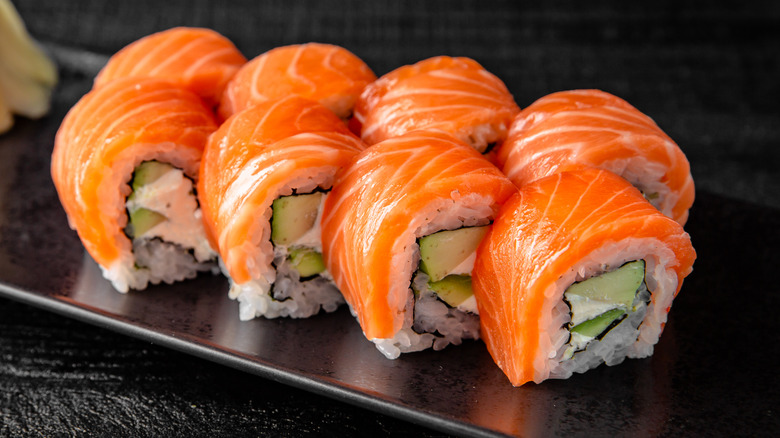How To Tell When It's Okay To Order Sushi In A Land-Locked State
Eating good sushi in a landlocked state, whether it's Vermont or Kansas, is only possible thanks to modern refrigeration and transportation technology. The temperature and time regulations raw fish products are subject to are part of the reason why fish that is processed in California can still be good by the time it reaches Oklahoma.
Fish labeled as "sushi-grade" has been determined to be of a quality high enough to be served raw. In order to make that call, however, the purchased fish has to have met the following parameters. First, the fish needs to have been processed — that is, boned, bled, filleted, and flash-frozen for either seven days at -4 degrees Fahrenheit or 15 hours at -31 degrees Fahrenheit. These temperatures and timeframes will kill any parasites while maintaining the fish's structural integrity. This is the standard process that makes transported fish safe to eat.
To be clear, with all the safety precautions taken, there is no reason to think that you will be eating something bad simply because there isn't an ocean nearby. The fish is likely safe to eat, but there are a few other factors to remember before you place your order in a state far from the coast.
Relying on your senses
Of all the senses we rely on when it comes to food, none is more powerful or important than smell. When it comes to fish, if it smells bad, don't eat it. Fish should have a fresh, slightly saline smell. If it is sour or giving off a strong scent of ammonia, don't eat it. Inspecting the fish visually will help in this regard too. Good fish should have shiny flesh and a bit of a bounce. If the flesh appears limp, dry, or gray, there is a good chance it's gone bad.
While any good restaurant or grocery store sushi counter should know this, it behooves the consumer to pay attention to whether or not an establishment is using fish at the peak of its flavor. If the sushi is slathered in sauce or other overpowering ingredients, it's an indicator that the fish, despite being safe to eat, might be past its prime. If the fish is plain, as with sashimi or nigiri, with little more than a light garnish of soy sauce, it is going to be of better quality and freshness.
The thing about sushi is that because it is being served raw, more work must go into procuring and keeping it fresh. As long as proper steps are taken to ensure that you're receiving the best sushi possible, with modern tech, location is of little importance.

